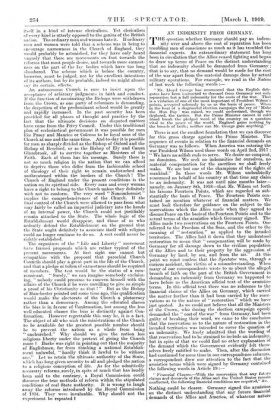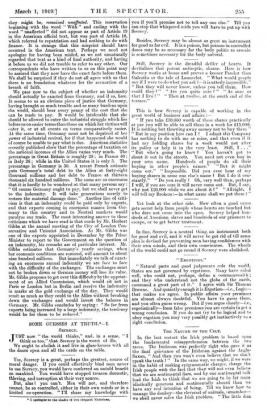AN INDEMNITY FROM GERMANY.
rilHE question whether Germany should pay an indem- 1. nity over and above the cost of reparation has been troubling men of conscience as much as it has troubled the financial experts. An extraordinary statement has long been in circulation that the Allies ceased fighting and began to draw up terms of Peace on the distinct understanding that no indemnity should be demanded from Germany ; that is to say, that no demand would be made for the cost of the war apart from the material damage done by actual military operations. For example, we read in the Nation of last week the following words :— " Mr. Lloyd George has announced that the English dele- gates have been instructed to demand from Germany not only reparation but a full indemnity for the costs of the war. That is a violation of one of the most important of President Wilson's points, accepted solemnly by us as the basis of peace. When in the heat of a disgraceful election campaign the cry of Make the Hun Pay' was raised, we could understand, though we deplored, the tactics. But the Prime Minister cannot in cold blood break the pledged word of the country on a question vital to the peace of the world. England gains nothing by the breach of faith ; neither can Mr. George gain anything."
There is not the smallest foundation that we can discover for this gross charge against the Prime Minister. The sequence of events in relation to the financial demands on Germany was as follows. When America was entering the war President Wilson used these words on April 2nd, 1917 " We have no selfish ends to serve. We desire no conquest, no dominion. We seek no indemnities for ourselves, no material compensation for the sacrifices we shall freely make. We are but one of the champions of the rights of mankind." In those words Mr. Wilson undoubtedly renounced on 'behalf of his country at that time ,any claim to an indemnity. It was not until nine months later— namely, on January 8th, 1918—that Mr. Wilson set forth his famous Fourteen Points, which are regarded as sub- stantially the basis of Peace. The Fourteen Points con- tained no mention whatever of financial matters. We must look therefore for guidance on the subject to the reservations which the Allies made when they agreed to 'discuss Peace on the basis of theFourteen Points and to the actual terms of the armistice which Germany signed. The Allies made two reservations on the Fourteen Points. One referred to the Freedom of the Seas, and the other to the meaning of " restoration " as applied to the invaded territories. The Allies laid it down that they understood restoration to mean that " compensation will be made by Germany for all damage down to the civilian population of the Allies and to their property by the aggression of Germany by land, by sea, and from the air." At this point we must confess that the Spectator was, through a curious accident, the victim of a misunderstanding. When many of our correspondents wrote to us about the alleged breach of faith on the part of the British Government in demanding an indemnity from Germany we happened to have before us the American official text of the armistice terms. In this official text there was no reference to the financial claims of the Allies on Germany, which carried the matter further than it had been earned by the reser- vations as to the nature of " restoration " which we have just quoted. As we could not believe that all the Ministers of the Crown, who during the election campaign openly demanded the "cost of the war" from Germany, had been guilty of breaking their word, we came to the conclusion that the reservation as to the nature of restoration in the invaded territories was intended to oover the question of an indemnity. We freely admitted that the wording of that reservation had to be strained to include an indemnity, but in spite of that we could find no other explanation of the demand which the Government evidently felt them- selves freely entitled to make. Then, after the discussion had continued for some time in our correspondence columns, a correspondent drew our attention to the fact that the armistice terms which were signed by Germany contained the following words in Article 19
"Financial Clauses.—With the reservation that any future claims and demands of the Allies and the United States remain unaffected, the following financial conditions are required," &c.
Nothing could be clearer. Germany signed the. armistice on the distinct understanding that any future financial demands of the Allies and America, of whatever nature
they might- be remained unaffected. This reservation beginning -with the word ." Witli " and ending with the word. " unaffected " did not appear as part of Article 19 in the American official text, but was part of Article 18, which referred to repatriation and had nothing to do with finance. It is strange that this misprint should have occurred in the American text. Perhaps we need not apologize for having been misled, as we not unnaturally regarded that text as a kind of final authority, and having it before us we did not trouble to refer to any other. Our correspondents who have written to us on this point may be assured that they now have the exact facts before them. We shall be surprised if they do not all agree with us that there is no foundation whatever for the accusation of a breach of faith.
We pass now to the subject of whether an indemnity should actually be exacted from Germany, and if so, how. It seems to us an obvious piece of justice that Germany, having brought so much trouble and so many burdens upon the world, should bear every penny of the cost that she can be made to pay. It would be intolerable that she should be allowed to enter the industrial struggle which lies before us on easier terms than those on which her victims will enter it, or at all events on terms comparatively easier. At the same time, Germany must not be deprived of her power of industrial revival, for if that happened she would of course be unable to pay what is due. American statistics recently published show that the percentage of taxation on the national incomes of the Allies varies very much. The percentage in Great Britain is roughly 28 ; m France 40 ; in Italy 26 ; while in the United States it is only 5. The percentage in Germany is 30. A recent French estimate puts Germany's total debt to the Allies at forty-eight thousand millions and her debt to France at thirteen thousand six hundred millions. The sums are so enormous that it is hardly to be wondered at that many persons say : " Of course Germany ought to pay, but we shall never get to the indemnity. It will take generations merely to restore the material damage done." Another line of criti- cism is that an indemnity could be paid only by exports, and that exports coming in enormous masses from Ger- many to- this country and to Neutral markets would paralyse our trade. The moat interesting answer to these criticisms which we have read is that made by Mr. Herbert Gibbs at the annual meeting of the City of London Con- servative and Unionist Association. As Mr. Gibbs was one of the experts appointed in December by the Prime Minister to report to the Government on the question of an indemnity, his remarks are of particular interest. Mr. Gibbs estimates that Germany's yearly savings, when her economic conditions are restored, will amount to about nine hundred millions. But immediately we talk of exact- ing an enormous annual indemnity we are face to face with the difficulty of the exchanges. The exchanges must not be broken down or German money will lose its value. Mr. Gibbs proposes to get over this difficulty by the appoint- ment of an Allied Commission, which would sit not in Paris or London but in Berlin and receive the indemnity in marks at the gold exchange of the day. They would remit as much as they could to the Allies without breaking down the exchanges and would invest the balance in Germany. Mr. Gibbs concludes by saying : " So far from exports being increased by a large indemnity, the tendency would be for them to be reduced."



































 Previous page
Previous page